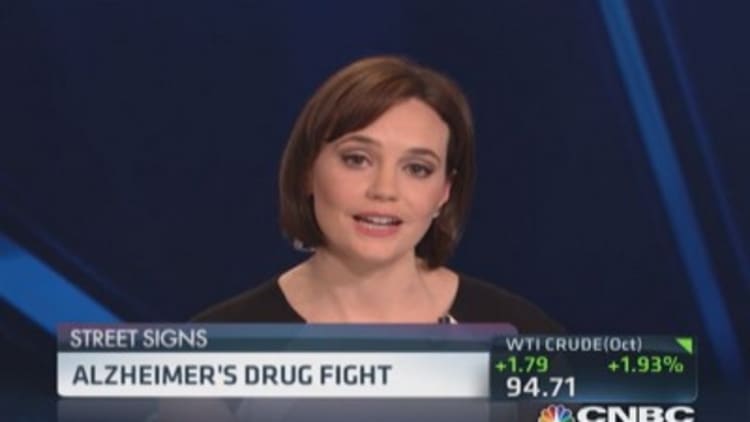Investors in drugmaker Actavis may be waking up to risks they initially didn't recognize.
The stock was down more than 1 percent Wednesday as analysts warned an antitrust lawsuit filed by New York Attorney General Eric Schneiderman could have big implications for the company.
The attorney general claims Actavis' plans to discontinue the Alzheimer's medicine Namenda and switch patients to an extended-release version of the drug ahead of its patent expiration are manipulative, unethical and illegal.
Actavis, which got Namenda through its acquisition of Forest Labs, is employing a strategy known as a "hard" or "forced switch." It's a technique employed with increasing frequency in the drug industry as part of product life-cycle management, Sanford C. Bernstein analyst Ronny Gal said.
Read MoreWhy dying kids can't get the drugs they need
"That would be kind of equivalent to Apple introducing the iPhone 6 and then making all the iPhone 5s stop working," Gal explained.
Namenda drew $1.5 billion in revenue in fiscal 2014, so preventing erosion of those sales to cheaper generic copies is in the company's interest. Namenda's patent expires next year, while Namenda XR has protection through 2029.
The company is counting on it being difficult for patients to switch medications again once generic copies of the twice-a-day Namenda hit the market, after they've already switched to the once-a-day formulation, the attorney general said in a statement Tuesday.
"A drug company manipulating vulnerable patients and forcing physicians to alter treatment plans unnecessarily simply to protect corporate profits is unethical and illegal," Schneiderman said.
Read MoreThe Alzheimer's epidemic: Where we stand
Actavis declined to comment on the suit, but said in a statement that Namenda XR "has significant advantages over twice-a-day Namenda that are particularly meaningful for Alzheimer's patients and their caregivers."
That the drug is for a particularly vulnerable population of mostly elderly patients with dementia makes the situation worse, said Art Caplan, a bioethicist at New York University.
"One of the particularly morally pernicious aspects of trying to do a forced switch is you're doing it in a group of moderate to severely impaired people with Alzheimer's," Caplan said in an interview. "The hard switch, I think, is fundamentally unethical."
The problem is, it works. Gal said the hard switch is more effective than a soft switch, which involves introducing the newer product without pulling the older one from the market before generics hit.

"With Namenda, when they were initially trying a soft switch approach, they were getting about 30 percent to switch or so," Gal said.
On a hard switch, Gal said Bernstein's analysis shows a company can keep about 90 percent of the market, on average, versus about half for a soft switch.
Read MoreDad-turned-CEO inks Pfizer deal for Duchenne drugs
BMO Capital Markets analyst David Maris said if Actavis can't employ the forced-switch strategy, it leaves about $990 million in annual revenue "open to severe generic competition that was not open to competition before."
Actavis' stock rose Tuesday, suggesting investors didn't initially anticipate the lawsuit would have teeth. But analysts say they might want to pay closer attention—not just for Actavis' strategy, but for a technique employed across the industry.
"This goes to the heart of the entire strategy," Gal said. "And to the extent that strategy becomes illegal, it will be a risk for the specialty pharma group, in particular, because they have been using this quite often. So this is something that the pharma industry will clearly object to, this is something we believe the payers will probably support, something we think the FTC will support."
In other words, Gal said, "this will probably become a pretty big fight within the drug industry."
—By CNBC's Meg Tirrell


